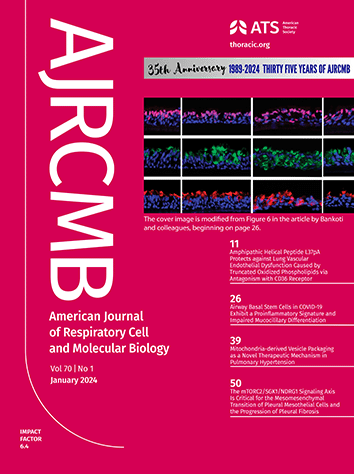Cell-Specific Contribution of IL4 Receptor α Signaling Shapes the Overall Manifestation of Allergic Airway Disease.
IF 5.9
2区 医学
Q1 BIOCHEMISTRY & MOLECULAR BIOLOGY
American Journal of Respiratory Cell and Molecular Biology
Pub Date : 2024-09-10
DOI:10.1165/rcmb.2024-0208oc
引用次数: 0
Abstract
IL-4 and IL-13 play a critical role in allergic asthma pathogenesis via their common receptor, i.e., IL4Rα. However, the cell-specific role of IL4Rα in mixed allergens (MA)-induced allergic asthma has remained unclear. Therefore, we aimed to identify the cell-specific contribution of IL4Rα signaling in the manifestation of various pathological outcomes in mice with allergic airway disease. We compared MA-induced pathological outcomes between hematopoietic progenitor cells (HPCs)- or non-HPCs-specific IL4Rα-deficient chimera, myeloid cell-specific IL4Rα-deficient (LysMcre+/+/IL4Rαfl/fl), and airway epithelial cell-specific IL4Rα-deficient (CCSP-Cre+ /IL4Rαfl/fl) mice. Chimeric mice with systemic IL4Rα sufficiency displayed hallmark features of allergic asthma, including eosinophilic and lymphocytic infiltration, type 2 (Th2) cytokine/chemokine production, IgE production, and lung pathology. These features were markedly reduced in chimeric mice with systemic IL4Rα deficiency. Non-HPCs-specific IL4Rα-deficient mice displayed typical inflammatory features of allergic asthma but with markedly reduced mucous cell metaplasia (MCM). Deletion of IL4Rα signaling on airway epithelial cells, a subpopulation within the non-HPC lineage, resulted in almost complete absence of MCM. In contrast, all features of allergic asthma except for MCM and mucin production were mitigated in HPCs-specific IL4Rα-deficient chimeric mice. Deleting IL4Rα signaling in myeloid cells, a subpopulation within the HPC lineage, significantly alleviated MA-induced allergic airway inflammatory responses, but similar to the HPCs-specific IL4Rα-deficient chimeric mice, these mice showed significant MCM and mucin production. Our findings demonstrate that the differential allergen responsiveness seen in mice with HPCs-specific and non-HPCs-specific IL4Rα deficiency is predominantly driven by the absence of IL4Rα in myeloid cells and airway epithelial cells, respectively. Our findings also highlight distinct and mutually exclusive roles of IL4Rα signaling in mediating pathological outcomes within the myeloid and airway epithelial cell compartments.IL4受体α信号的细胞特异性贡献决定了过敏性气道疾病的整体表现。
IL-4和IL-13通过它们的共同受体(即IL4Rα)在过敏性哮喘发病机制中发挥关键作用。然而,IL4Rα在混合过敏原(MA)诱导的过敏性哮喘中的细胞特异性作用仍不清楚。因此,我们旨在确定IL4Rα信号在过敏性气道疾病小鼠各种病理结果的表现中的细胞特异性贡献。我们比较了造血祖细胞(HPCs)或非HPCs特异性IL4Rα缺陷嵌合体、骨髓细胞特异性IL4Rα缺陷(LysMcre+/+/IL4Rαfl/fl)和气道上皮细胞特异性IL4Rα缺陷(CCSP-Cre+ /IL4Rαfl/fl)小鼠的MA诱导病理结果。全身 IL4Rα 充分的嵌合小鼠显示出过敏性哮喘的标志性特征,包括嗜酸性粒细胞和淋巴细胞浸润、2 型(Th2)细胞因子/趋化因子产生、IgE 产生和肺部病理变化。全身性 IL4Rα 缺乏的嵌合小鼠的这些特征明显减少。非 HPCs 特异性 IL4Rα 缺乏的小鼠表现出典型的过敏性哮喘炎症特征,但粘液细胞增生(MCM)明显减少。删除气道上皮细胞(非 HPC 系的一个亚群)上的 IL4Rα 信号导致 MCM 几乎完全消失。相反,在 HPC 特异性 IL4Rα 缺失的嵌合小鼠中,除 MCM 和粘蛋白产生外,过敏性哮喘的所有特征都得到了缓解。删除髓系细胞(HPC 系中的一个亚群)中的 IL4Rα 信号可显著减轻 MA 诱导的过敏性气道炎症反应,但与 HPCs 特异性 IL4Rα 缺失嵌合小鼠类似,这些小鼠表现出明显的 MCM 和粘蛋白生成。我们的研究结果表明,HPCs 特异性和非 HPCs 特异性 IL4Rα 缺陷小鼠对过敏原的不同反应主要是由于髓系细胞和气道上皮细胞中分别缺乏 IL4Rα 所导致的。我们的研究结果还突显了IL4Rα信号在介导髓系细胞和气道上皮细胞病理结果中的不同且相互排斥的作用。
本文章由计算机程序翻译,如有差异,请以英文原文为准。
求助全文
约1分钟内获得全文
求助全文
来源期刊
CiteScore
11.20
自引率
3.10%
发文量
370
审稿时长
3-8 weeks
期刊介绍:
The American Journal of Respiratory Cell and Molecular Biology publishes papers that report significant and original observations in the area of pulmonary biology. The focus of the Journal includes, but is not limited to, cellular, biochemical, molecular, developmental, genetic, and immunologic studies of lung cells and molecules.

 求助内容:
求助内容: 应助结果提醒方式:
应助结果提醒方式:


